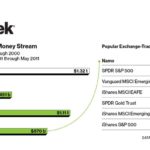Volumes have been written on the topics of both “beating the market” and individual investing, but also on passive strategies. Â In my view, over the long haul, it’s much more important to get money INTO your investment accounts and put it to work compared to whether you can beat the market or not. Â But once you’ve been building funds for some time and start to have real money you’re working with, some people aren’t satisfied with matching the indices and want to boost their returns through various means ranging from using leverage to more aggressive share trading. Â Here’s I’ll run through some of the pros and cons to being an active trader:
Pros of Active Trading
- Ability to Beat the Market – Remember the dotcom boom? Â I used to see people I knew trading in and out of internet stocks making a killing. Â While they didn’t all get out at the right time, they were making a killing by buying what was hot. Â They were beating the heck out of the indices, even the Nasdaq. Â In large part, this is all about Beta, and high Beta stocks should be an index in an up market and get crushed in a correction, but the long-term trend of equities is up, right? Â So, many people did and continue to do quite well trading what’s hot.
- When the Market is Irrational – Remember when the world was coming to an end in March 2009? Â Stocks were about 50% off their old lows and everything was priced for an outright Depression. Â I bought. Â Things were just too oversold. Â I bought Apple, Amazon, Baidu and some other stocks that had been absolutely hammered and they did great on the way back up. Â Again, the individual stocks outperformed the indices and timing had a great to do with it as well.
- TrendSpotter – Speaking of Apple, do you feel you can see trends that the market is missing? Â I felt I did with Apple, Chipotle and others. Â Late last year I grabbed 3D systems as well when all the hype was brewing about 3D printing. Â Unfortunately on that one, I didn’t sell in time for that bubble to deflate. Â The opportunities are certainly there to spot trends and beat the market as long as you sell and don’t get greedy (like I did).
Cons of Active Trading
- Costs – Active trading costs more than owning a typical ETF or mutual fund. Â Not only are there trading costs, but often a higher tax bill if you’re generating capital gains throughout the year instead of holding. Â Therefore, your positive alpha must account for these higher costs.
- The Market is Tough to Beat – There are plenty of studies showing that even professional money managers don’t tend to beat the market over the long-term. Â One must keep in mind of course that they are bound by regulations that we aren’t as individual investors (like ability to trade options, buy and sell whatever stocks and sectors we choose as opposed to a sector/theme and money manager may be bound to, etc). Â But overall, you’ve got to be at the top of your cohort to do better than match the indices.
- Emotion – One of the most important attributes of a successful daytrader for instance is the ability to distance themselves from any sort of emotion tied to the stocks their taking positions in or selling short. Â For instance, they might love the company or hate the recent earnings announcement, but if they spot a trend that fits their criteria, they need to trade it, regardless. Â The same is true of routine individual investing, but so many investors become enamored with a particular stock. Â They follow the Buffett “buy what you know” mantra and then find that they can’t sell! Â In order to be successful, you have to be objective, robotic and remove emotion from the equation.
Do You Find Yourself to Be a Passive or Active Investor?











{ 0 comments… add one now }